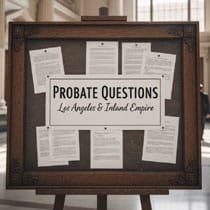 “Unusual Items” in California Probate
“Unusual Items” in California Probate
Question: What are “unusual items” according to California Probate Code § 1064(a)(2) which is applicable to Greater Los Angles area too, and how does this distinction affect estate administration?
Answer: Under California Probate Code § 1064(a)(2), “unusual items” refers to estate expenses or transactions that are not considered ordinary or routine. While the code doesn’t provide a specific list, courts generally consider items like major home repairs, significant litigation costs, or large-scale property sales as unusual. This distinction is crucial because it often requires the executor to seek prior court approval before incurring the expense or taking the action. Failure to do so could result in the executor being denied reimbursement or even being held personally liable if the court deems the expense unreasonable or unnecessary. The requirement for court approval provides a safeguard to prevent the misuse of estate assets and protects the interests of beneficiaries.
Enforceability of No-Contest Clauses in California
Question: Are no-contest clauses enforceable in Entire Inland Empire area in California as far as wills and trusts are concerned, and what are the limitations?
Answer: In California, a no-contest clause, also known as an “in terrorem” clause, is a provision in a will or trust designed to disinherit a beneficiary who challenges the document. Under California Probate Code §§ 21310-21315, these clauses are of limited enforceability. They can only disinherit a beneficiary if they contest the will or trust without probable cause. This means if a beneficiary has a reasonable belief, supported by facts, that the document is invalid—for reasons like undue influence, fraud, or forgery—they can challenge it without fear of being disinherited. The “probable cause” standard aims to balance the decedent’s right to control their estate with a beneficiary’s right to seek justice against a potentially invalid will. For example, if you challenge a will due to a strong suspicion of undue influence, even without conclusive proof, you might still have probable cause and not be disinherited.
Helping Clients in Los Angeles, and Entire Inland Empire in California
Call Us: 951-218-4083 Or 909-890-2350
Disposition of Remains: Will vs. Next of Kin
Question: In Los Angeles, California, who has the final say over the disposition of a decedent’s remains: the will or the next of kin?
Answer: Historically, the wishes of the next of kin have prevailed over instructions in a will. The landmark 1900 case, Enos v. Snyder, established this principle in California. In that case, the court ruled that a will is a document that becomes legally effective after death and pertains to property distribution, not the disposition of the body itself. Thus, the legal right to a dead body for the purposes of burial or cremation belongs to the next of kin. While modern probate law offers more clarity on this issue, with specific statutory authority often giving priority to a written instruction from the decedent, the historical legal precedent underscores the general principle that family rights and customs hold significant weight.
Handling Multiple Overlapping Probates
Question: How does California law address situations involving multiple, overlapping probates, such as when property is discovered in a different State?
Answer: The primary probate for a decedent is generally opened in the State where they resided. However, complications arise when new assets are discovered in a different State, or a co-executor or beneficiary dies. If new property is found in a different State, it’s typically handled as an ancillary probate, which is a separate proceeding in the new jurisdiction. However, if the new property is within California, it can often be handled within the original probate. If a new will is discovered or an old will surfaces after a probate is closed, the court may need to reopen the case. The specific legal mechanism for handling these issues depends on the circumstances but generally involves filing a petition to modify or reopen the existing probate case with the court.
Helping Clients in Los Angeles County, Greater Los Angeles area, and Entire Inland Empire
Call Us: 951-218-4083 Or 909-890-2350
Assets Omitted from a Will or Trust
Question: I live in Los Angeles County. What happens if assets are discovered after a will or trust has been administered, and can a court order their inclusion?
Answer: It’s common for assets to be accidentally omitted from a will or a trust, mislabeled, or overlooked entirely. When this happens, a beneficiary can petition the court to have the assets included. For trusts, this is often handled through a Heggstad petition (as mentioned in question 2), which can confirm that the asset was intended to be part of the trust estate. For assets omitted from a will or not covered by the trust, a separate probate action might be necessary. The court can order the executor or trustee to take control of the newly discovered assets and distribute them according to the decedent’s wishes as expressed in the estate plan.
Joint Accounts and Mental Incapacity
Question: If a person with declining mental capacity adds someone to their bank account, can an heir challenge this action after their death?
Answer: Yes, an heir can challenge the creation of a joint account or a change in property ownership if they believe it was done under mental incapacity, undue influence, or fraud. The timing of the conversion is critical; if the decedent was already suffering from dementia or another form of cognitive decline when the account was converted, this can be strong evidence that they lacked the capacity to make a sound decision. The person challenging the transfer would need to present evidence, such as medical records or witness testimony, to prove the decedent was mentally incapacitated at the time. This type of legal challenge is quite common and can lead to complex litigation.
Probate for Small Estates
Question: What is a “small estates affidavit” in California and when can it be used to avoid full probate in Inland Empire?
Answer: In California, a small estates affidavit is a legal document that allows a person to transfer property from a decedent without going through a formal probate process. To qualify, the total value of the decedent’s estate must not exceed a certain statutory threshold (currently $208,850 after April 1, 2025). Assets that are excluded from this calculation include vehicles, real property outside of California, and property held in trust. The affidavit can be used only after at least 40 days have passed since the decedent’s death. This process is much faster and less expensive than a full probate and is designed to provide a simplified way to handle modest estates.
Helping Clients in Riverside County, San Bernardino, Victorville, Hesperia, High Desert, and Entire Inland Empire
Call Us: 951-218-4083 Or 909-890-2350
Recording of Letters of Administration and County Issues
Question: What role do Letters of Administration play in dealing with county recorder and assessor’s offices, and what common issues arise?
Answer: Letters of Administration (or Letters Testamentary if there’s a will) are legal documents issued by the probate court that grant the executor or administrator the authority to act on behalf of the estate. To transfer ownership of real property, these letters must be recorded with the county recorder’s office. Issues often arise when dealing with a county’s bureaucracy. For instance, the assessor’s office may not accept a Preliminary Change of Ownership Statement or a reassessment exclusion form until the Letters are recorded. This can create confusion and delays. It’s essential to understand the specific requirements of the county where the property is located to ensure a smooth transfer and avoid unnecessary tax reassessment.
Probate with a Lost or Late-Found Will
Question: If a will is lost, discovered late, or if there are multiple versions, how does California law determine which will, if any, is valid? Is that law applicable in Los Angeles City too?
Answer: The most recent, valid will generally supersedes all previous versions. If the only copy of a will is lost, a court may still admit it to probate if its terms can be proven with clear and convincing evidence, such as with a copy or witness testimony. If an undiscovered will surfaces after a probate has been closed, the interested party can petition the court to reopen the probate case. The court will then determine the validity of the newly discovered will and, if it is deemed valid, will order the estate to be administered according to its terms. This can lead to the redistribution of assets and is a complex legal process.
The California Law is applicable to the City of Los Angeles too.
The probate process in California can be complex. It is advisable to begin the process promptly to avoid complications. Consulting a qualified probate attorney like Law Office of Antoniette Jauregui for the probate cases in Los Angeles, Greater Los Angeles area or Inland Empire. You can also call her at 951-218-4083 or 909-890-2350 is highly recommended to determine whether probate is necessary and to correctly navigate the legal process.
Or you can Contact Us through the following form:
The information given in this blog does not constitute the legal advice and this blog is not part of the services provided on this website. It might not be up-to-date and is provided here on free of cost on honorary basis and is not for profit. You may contact your attorney for professional advise. For more details, please visit Terms & Conditions, Privacy Policy and How we deal with Intellectual property page through the link given at the footer area of the website.



